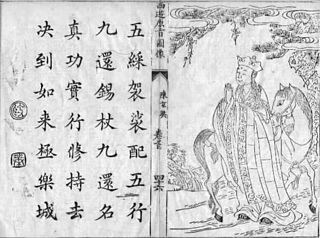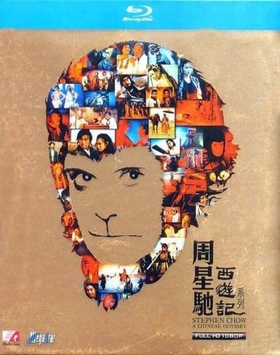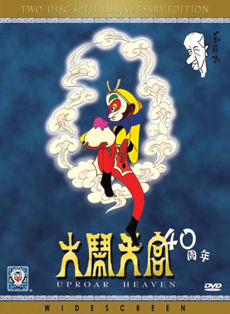Related Research Articles

The Monkey King or Sun Wukong is a fictional character best known as one of the main players in the 16th-century Chinese novel Journey to the West, and many later stories and adaptations. In the novel, Sun Wukong is a monkey born from a stone who acquires supernatural powers through Taoist practices. After rebelling against heaven, he is imprisoned under a mountain by the Buddha. After five hundred years, he accompanies the monk Tang Sanzang (唐三藏) riding on the White Dragon Horse and two other disciples, Zhu Bajie and Sha Wujing, on a journey to obtain Buddhist sutras from the West (India), where Buddha and his followers dwell.

Journey to the West is a Chinese novel published in the 16th century during the Ming dynasty and attributed to Wu Cheng'en. It is regarded as one of the greatest Classic Chinese Novels, and has been described as arguably the most popular literary work in East Asia. Arthur Waley's 1942 abridged translation, Monkey, is known in English-speaking countries.

Tang Sanzang is a Buddhist monk and pilgrim who is a central character in the 16th century novel Journey to the West by Wu Cheng'en. Tang Sanzang is based on the historical Tang dynasty monk Xuanzang.

A Chinese Odyssey is a two-part 1995 Hong Kong fantasy-comedy film directed by Jeffrey Lau and starring Stephen Chow.

Monkey: A Folk-Tale of China, more often known as simply Monkey, is an abridged translation published in 1942 by Arthur Waley of the sixteenth-century Chinese novel Journey to the West conventionally attributed to Wu Cheng'en of the Ming dynasty. Waley's remains one of the most-read English-language versions of the novel. The British poet Edith Sitwell characterized Monkey as "a masterpiece of right sound", one that was "absence of shadow, like the clearance and directness of Monkey's mind." The translation won the James Tait Black Memorial Prize in 1942.

Baigujing is a demon from the 16th century novel Journey to the West. The name is translated into English as White Bone Spirit in the William John Francis Jenner translation. Baigujing is a shapeshifting demoness, and in her true form she is depicted as a skeleton.
Shanghai Animation Film Studio, also known as SAFS, is a Chinese animation studio based in Shanghai, China, as part of the Shanghai Film Group Corporation. Shanghai Animation Film Studio was officially established in April 1957, led by pioneering animators and artists, including Te Wei, and the Wan Brothers. It has produced around 500 films with over 40,000 minutes of original animation data source, covering 80% of China's domestic animation production.

Havoc in Heaven, also translated as Uproar in Heaven, is a 1961 Chinese donghua feature film directed by Wan Laiming and produced by all four of the Wan brothers. The film was created at the height of the Chinese animation industry in the 1960s, and received numerous awards, earning the brothers domestic and international recognition. The story is an adaptation of the earlier episodes of the 16th-century Chinese novel Journey to the West.

Monkey: Journey to the West is a stage adaptation of the 16th century novel Journey to the West by Wu Cheng'en. It was conceived and created by the Chinese actor and director Chen Shi-Zheng along with British musician Damon Albarn and British artist Jamie Hewlett.

The Monkey King is a 2014 Hong Kong-Chinese action-fantasy film directed by Soi Cheang and starring Donnie Yen as the titular protagonist Sun Wukong. Yen also serves as the film's action director. The film co-stars Donald Chow, Aaron Kwok, Joe Chen and Peter Ho.

Bull Demon King, also translated as the Ox King and known as his self-proclaimed title the Great Sage Who Pacifies Heaven, is a fictional character from the 16th century novel Journey to the West. He is the estranged-husband of the Princess Iron Fan and father of Red Boy. He is a demon king originally-based in the "Palm leaf Cave/Grotto", up on "Jade Cloud Mountain", with his wife, before betraying his wife for a younger demoness, Princess Jade-Countenance, a female Huli jing, of the "Sky-Scraping Cave" on "Accumulated-Thunder Mountain".

Journey to the West: Conquering the Demons is a 2013 fantasy comedy film co-written and produced by Stephen Chow and co-directed by Chow and Derek Kwok. The movie was first announced in July 2011 and was released on February 10, 2013 in China. The film is a loose comedic re-interpretation of the 16th-century novel Journey to the West, a Chinese literary classic often believed to be written by Wu Cheng'en.

The Monkey King Festival is celebrated in Hong Kong on the 16th day of the eighth Lunar month of the Chinese calendar, corresponding to September according to the Common era calendar, a day after the Mid Autumn Festival. The origin of the festival is traced to the epic 16th century novel Journey to the West written by the Chinese novelist Wu Cheng'en (1500–1582) during the Ming dynasty (1368–1644). The novel brings out the concept of immortality from Taoism and rebirth from Buddhism. The monkey Sun Wukong, a character in the novel, is the featured figure of the festival.

The Monkey King 2 is a 2016 Hong Kong-Chinese action fantasy film based on the classic 16th-century novel Journey to the West by Wu Cheng'en. The film was shot in 3D and is a sequel to the 2014 box office hit The Monkey King with Cheang Pou-soi returning as director and Sammo Hung as action director, who replaces Donnie Yen's role from the previous installment. The film stars Aaron Kwok, who portrayed the main antagonist in the previous installment, as the film's titular protagonist, who also replaces Yen from the previous installment. It was released in the United States on 5 February, in Hong Kong on 6 February and in China on 8 February 2016. A sequel, The Monkey King 3, was released in China in 2018.

Monkey King: Hero Is Back is a 2015 Chinese computer-animated fantasy adventure film written and directed by Tian Xiaopeng in his directorial debut. The film was released on 10 July 2015, and became the highest-grossing animated film in China until it was surpassed by the 2016 films Zootopia and Kung Fu Panda 3.

Journey to the West: The Demons Strike Back is a 2017 Chinese fantasy adventure comedy film directed by Tsui Hark. A sequel to Stephen Chow's 2013 film Journey to the West: Conquering the Demons, it was produced and co-written by both Tsui and Chow.

Kui Mulang is a deity in traditional Chinese spiritual beliefs. He is considered to be one of the 28 Mansions, which are Chinese constellations. These constellations are the same as those studied in Western astrology. Kui Mulang originated from the ancient Chinese worship of the constellations, a spiritual practice that combines Chinese mythology and astronomy.
Lego Monkie Kid is a Lego theme inspired by Monkey King and Journey to the West. It is licensed from The Lego Group. The theme was first introduced in May 2020. The toy line is also accompanied by an animated television series that premiered in China on May 29, 2020, with the special Lego Monkie Kid: A Hero Is Born.
References
- ↑ "The Monkey King Conquers the Demon Full Cast and Crew". IMDb.
- 1 2 3 4 Sun, Lijun (2020). The History of Chinese Animation II. Routledge. ISBN 9781000740530.
- ↑ "1987 Official Selection, film index". Annecy Festival. Retrieved June 10, 2020.
- ↑ "The Monkey King Conquers The Demon (2 DVDs)". Purple Culture.
- ↑ "第6届中国电影金鸡奖 The 6th Golden Rooster Awards". 豆瓣电影. 1 January 1986.
- ↑ "Children's Film Fest Highlights". Chicago Tribune. 13 October 1989.